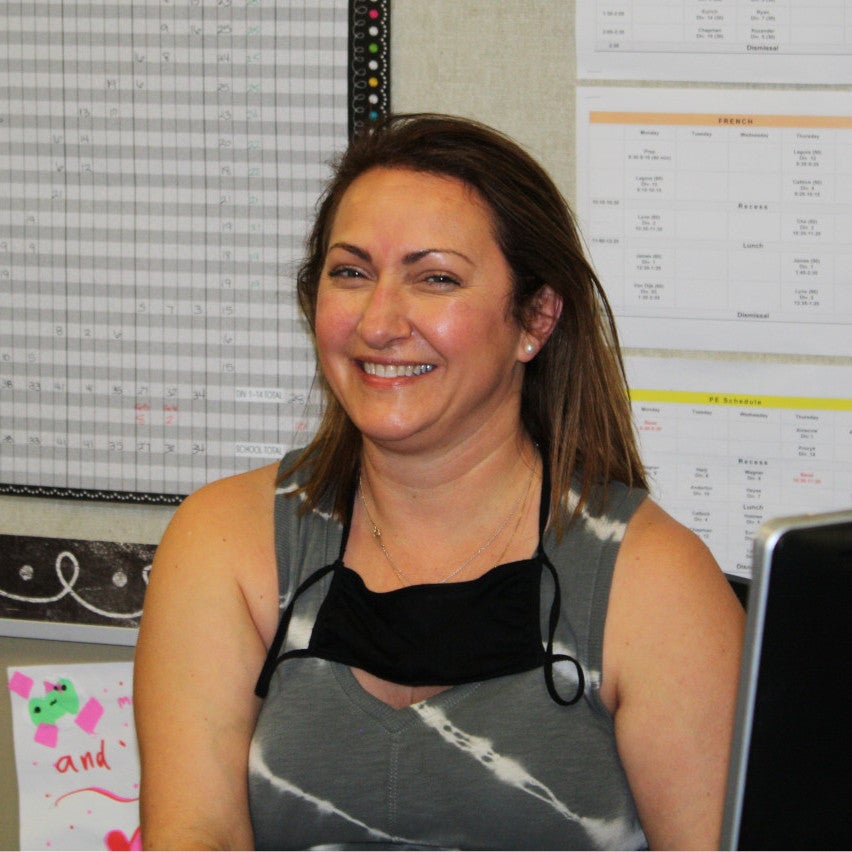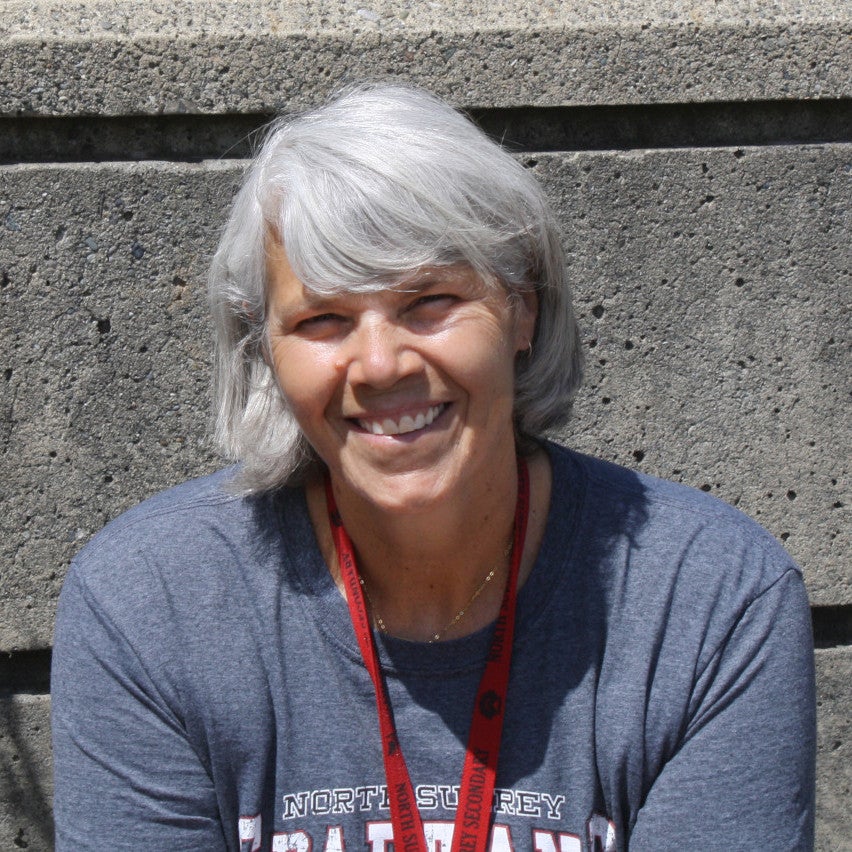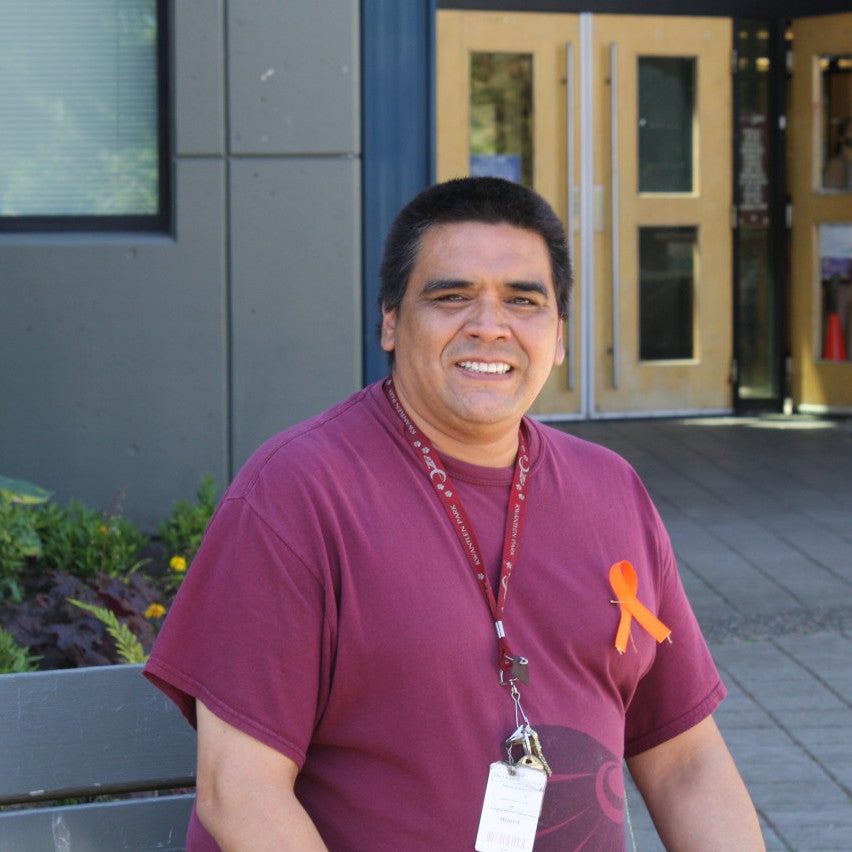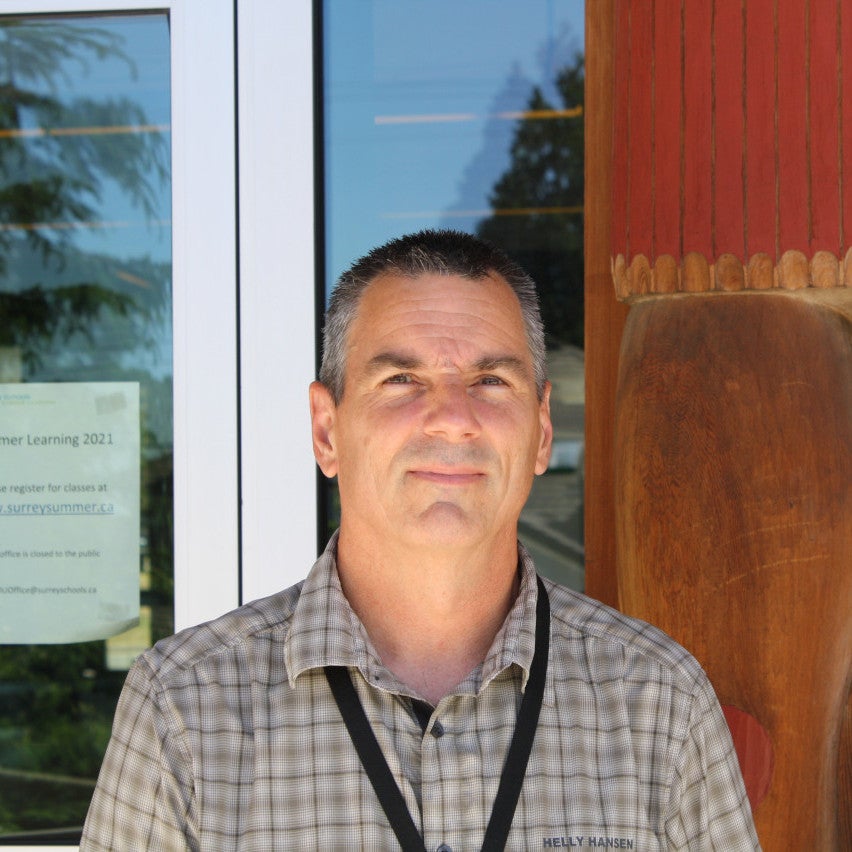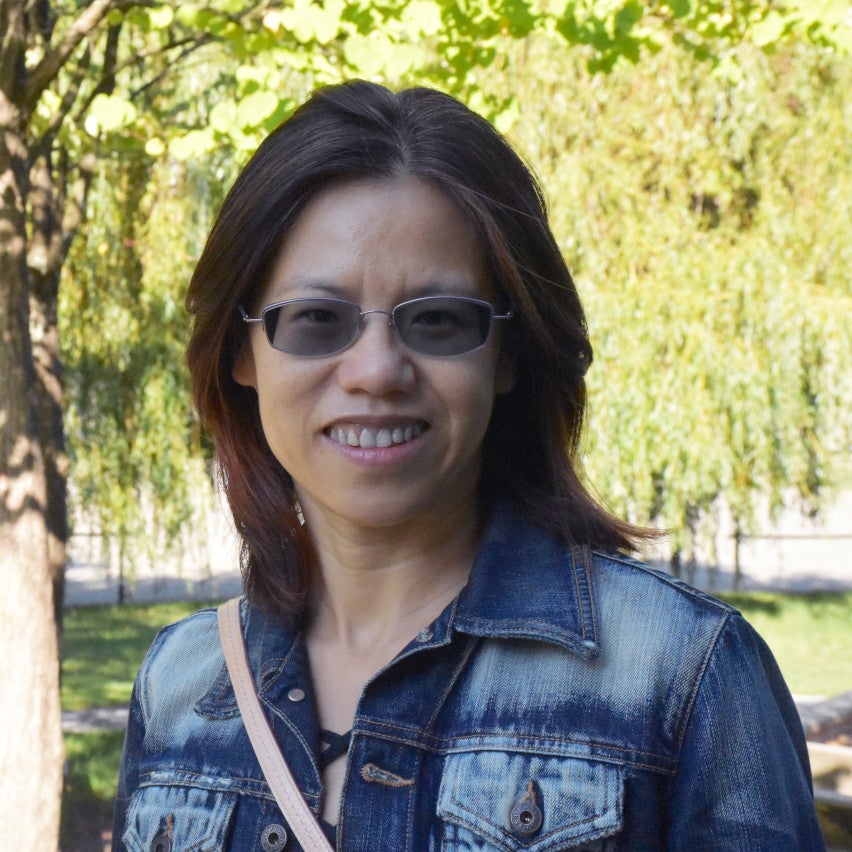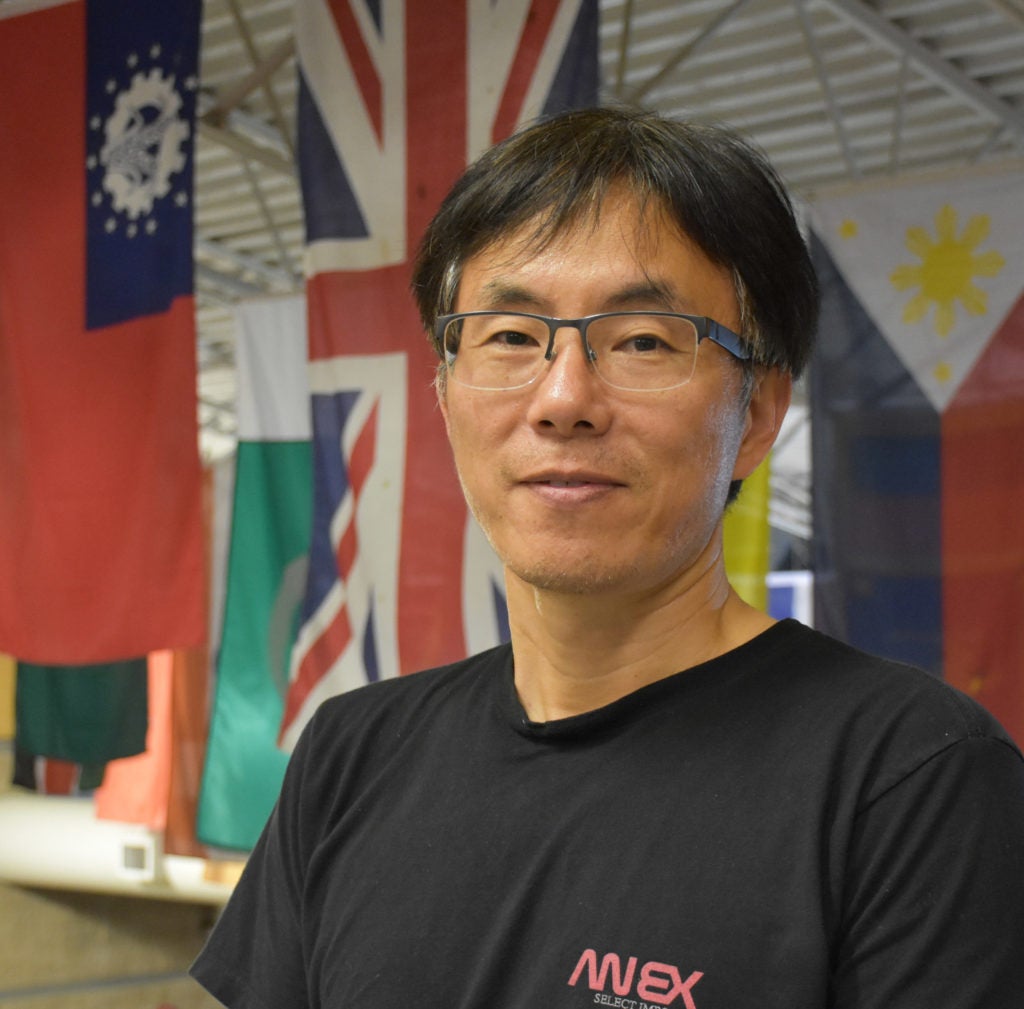
Tony K
Caretaker
Clayton Elementary
“It’s better for students to have daytime custodians. It means that I can take care of things as they come up — cleaning up spills, disinfecting and wiping high-use areas — keeping schools safe for students and staff.”
Before the pandemic there were no daytime custodians. Now I work during the day. It’s better for students that I am here so that I can take care of things as they come up. If something is spilled, I clean it up right away. I disinfect areas and concentrate on wiping high use areas like tables. I also make sure that the security system at school is on. I enjoy working in public education and keeping schools safe for students and staff.
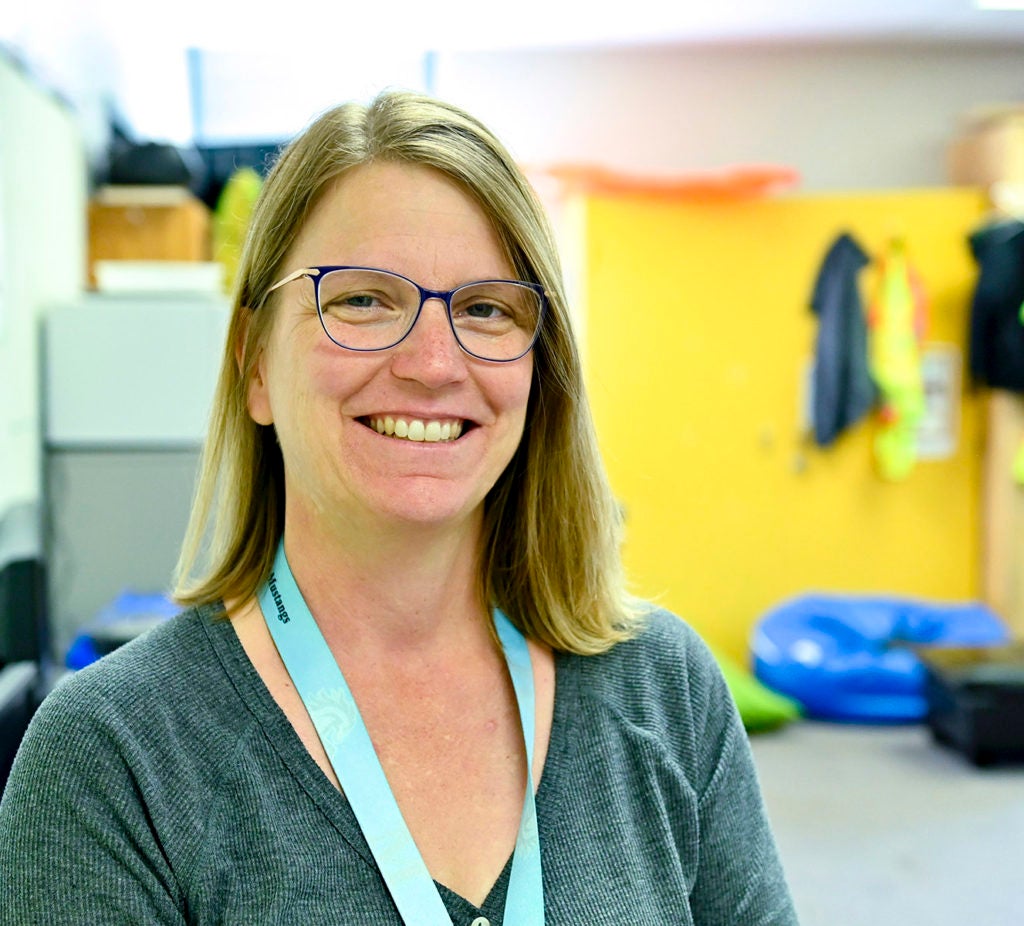
Angela K.
Education Assistant
LA Matheson Secondary
“Being an EA is believing in our students – seeing them as the incredible unique person that they are, celebrating their strengths and helping them in areas where they struggle.”
Being an EA is about believing in our students, presuming competence, believing that they can and want to learn. School can be a difficult environment for a lot of our kids and their very sensitive sensory system. When they become dysregulated, we need to have built a relationship of trust so that they will allow us to help them become regulated again. None of us can learn in an emotional state, so we need to help them with that.
Having the support of other staff and the school community is so very important. Our kids do not have “special needs,” they want to belong and be accepted for who they are just like everyone else. All of us need different types of support, and with the right supports in place our kids can reach the best of their potential.
Seeing them as the incredible unique person that they are and celebrating their strengths and helping them in areas where they struggle is the key.
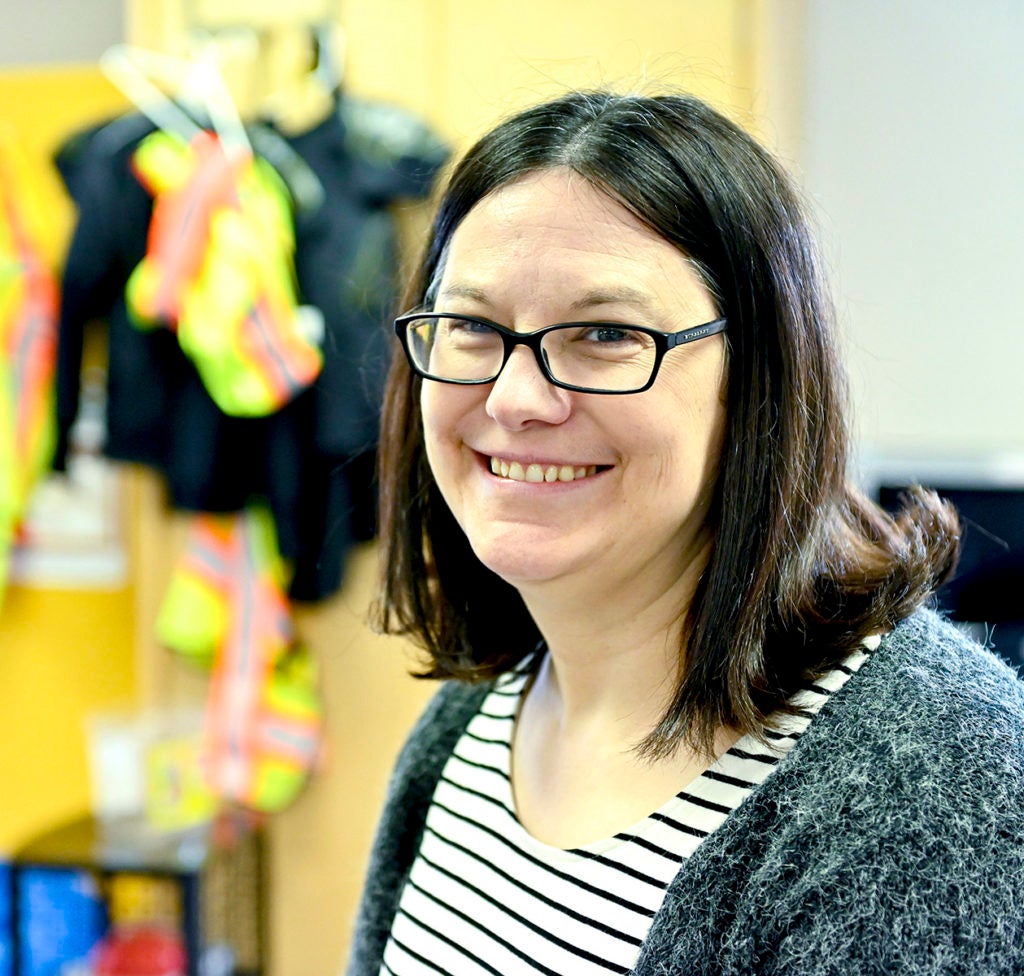
Amber M
ABA Support Worker
Latimer Road Elementary
“My work allows my student to be inclusive in the classroom, to be able to join in with their peer group. I work with non-verbal kiddos so working on communication is really important.”
Seeing the student I work with progress and succeed, inspires me to come to work every day and to be joyful and happy at work. My work allows my student to be inclusive in the classroom, to be able to join in with their peer group. I work with non-verbal kiddos so working on communication is really important. This pandemic has made it really hard to collaborate with other staff members, debrief, and discuss challenges. It’s been really hard because it’s isolating.
It’s concerning and stressful to keep student hours to full-time. A lot of times a student goes from full-time to 20 or 25 hours. ABAs can’t keep those positions because they need to have full-time hours, so a lot of those kids then have home programs but lose consistency with their treatment in the school system. Not everybody works the same way so if a lot of different people are working with that one child, the inconsistency creates a lot of unstructured time for these kiddos that already struggle.
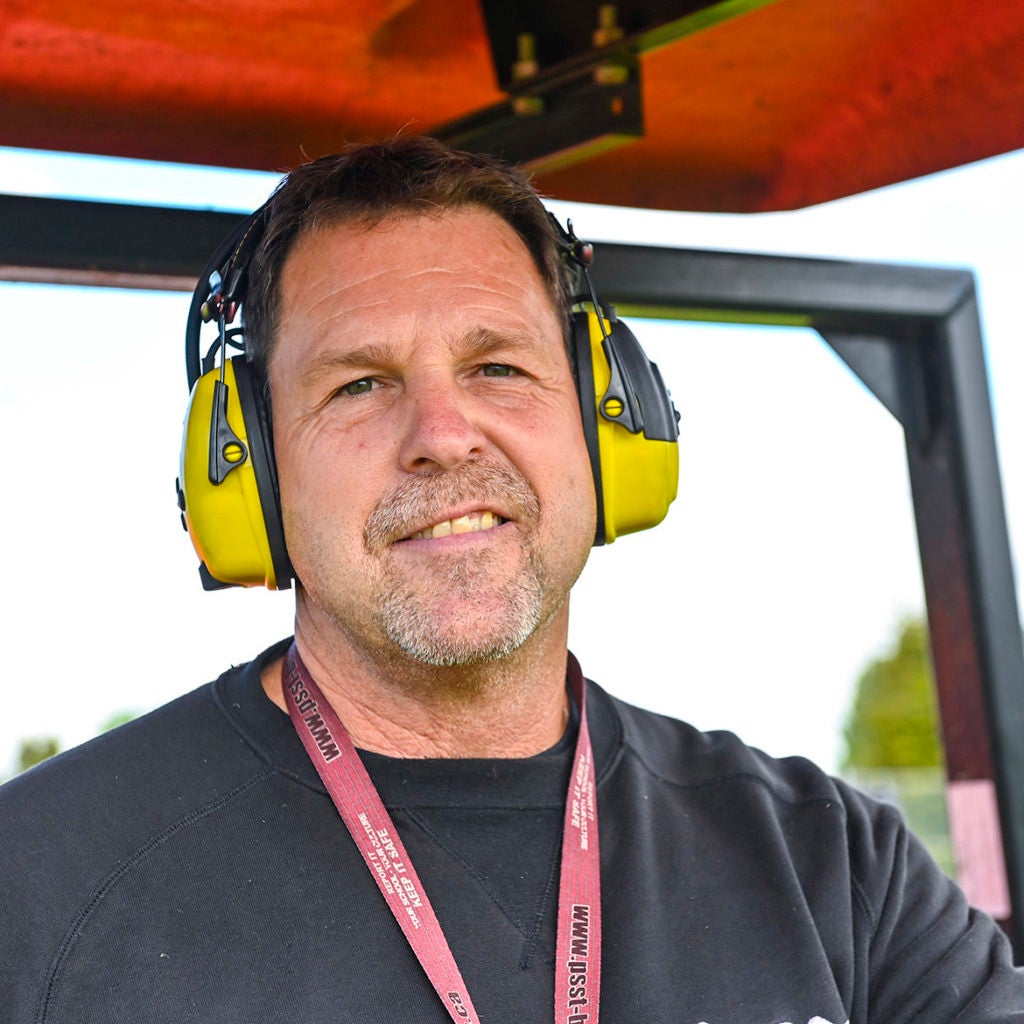
Loney B
Equipment Operator 2
SD 36 Grounds
“Our work is key to keeping schools safe and open in winter. In spring and summer our team keep fields maintained so students and sports groups can access the fields for PE classes and sports activities. Our two grounds departments work hard to accomplish everything that needs to be done.”
I’ve worked for the district for the past 33 years, and enjoy being outdoors and the variety of work. Currently, I operate a Sweeper that picks up grass clippings on the fields after the Grass cutting machines. We keep the fields maintained for the kids, sports teams and the rental groups that use them in the evenings. We have a full program to keep the grass healthy – soil sampling, overseeding the grass, top dressing, fertilizing, cutting and sweeping.
In grounds, there’s always a variety of jobs to complete. In winter, when we have snowy and icy conditions our work is key to keeping children and staff safe, and the schools open. Our school board trucks are equipped with plows and sanders to keep parking lots and school grounds clear of snow and ice. We sand, salt and plow, with some of our guys doing hand salting.
There are lots of employees in the two grounds departments that work hard to accomplish everything that needs to be done. It definitely takes a team and my work is just a fraction of what goes into the success of our department.
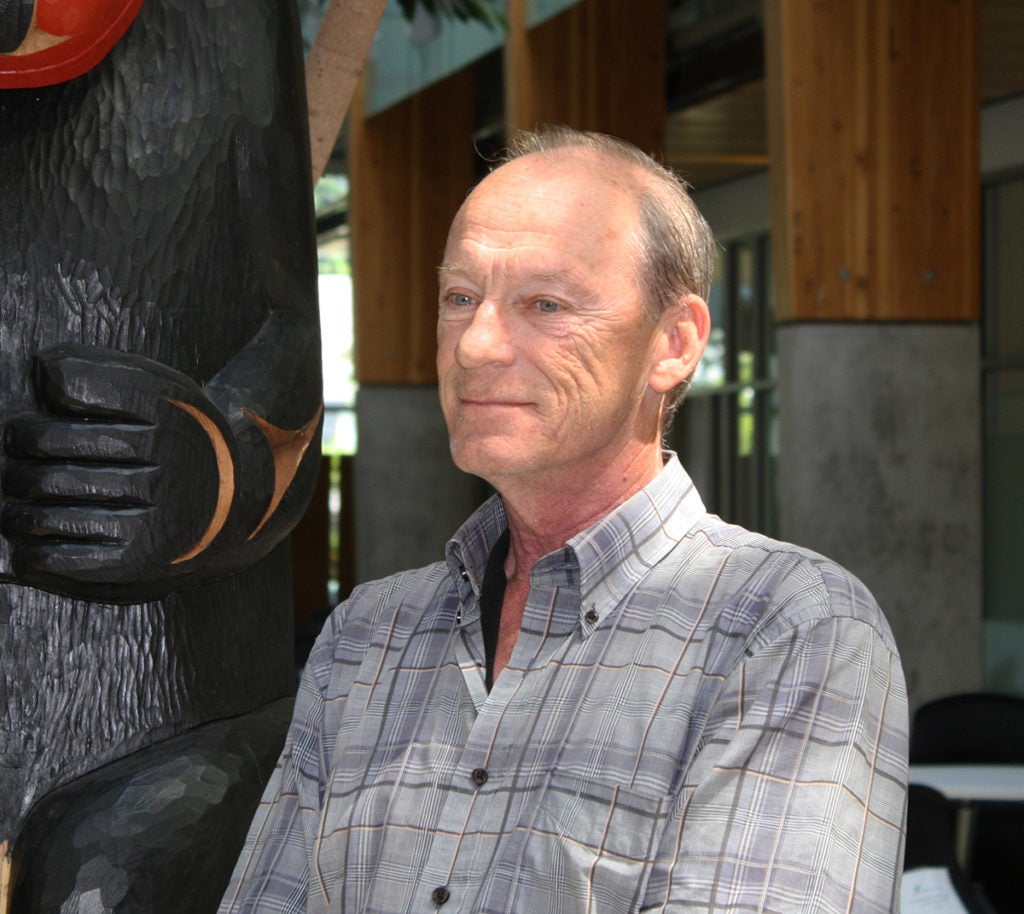
Bob V.
CUPE Payroll Team Lead
District Education Centre
“Our payroll department makes sure that employees get paid accurately and on time, every two weeks. It’s a lot of work and it’s important to us to get things right. We also answer questions and resolve problems to the best of our ability.”
Overall, I’m responsible to get employees paid accurately on time every two weeks. Our department ensures that people get set up to receive their benefits and pensions when they reach eligibility. I work with five CUPE staff members who do the lion’s share of the work. We do T4’s at the end of the year and make sure that when people leave, they get their vacation pay. It’s a lot of work and it’s important to us to get things right the first time. When employees don’t have to worry about their pay and have the peace of mind that they are being paid correctly, they can focus on their job.
This pandemic has made our work more challenging. When people work remotely, it makes it more difficult to keep things coordinated. There’s been such a huge increase in leaves during COVID. The sheer volume of time that people had to take off has increased our volume of work. Leaves are more manually intensive to process.
Most times people don’t pay much attention to payroll unless there are errors. Some of our staff have not even taken leave or vacation time. We’ve been working very hard at a more difficult level. We have a very dedicated team and we hope that staff understand the efforts we’ve been putting in for them.
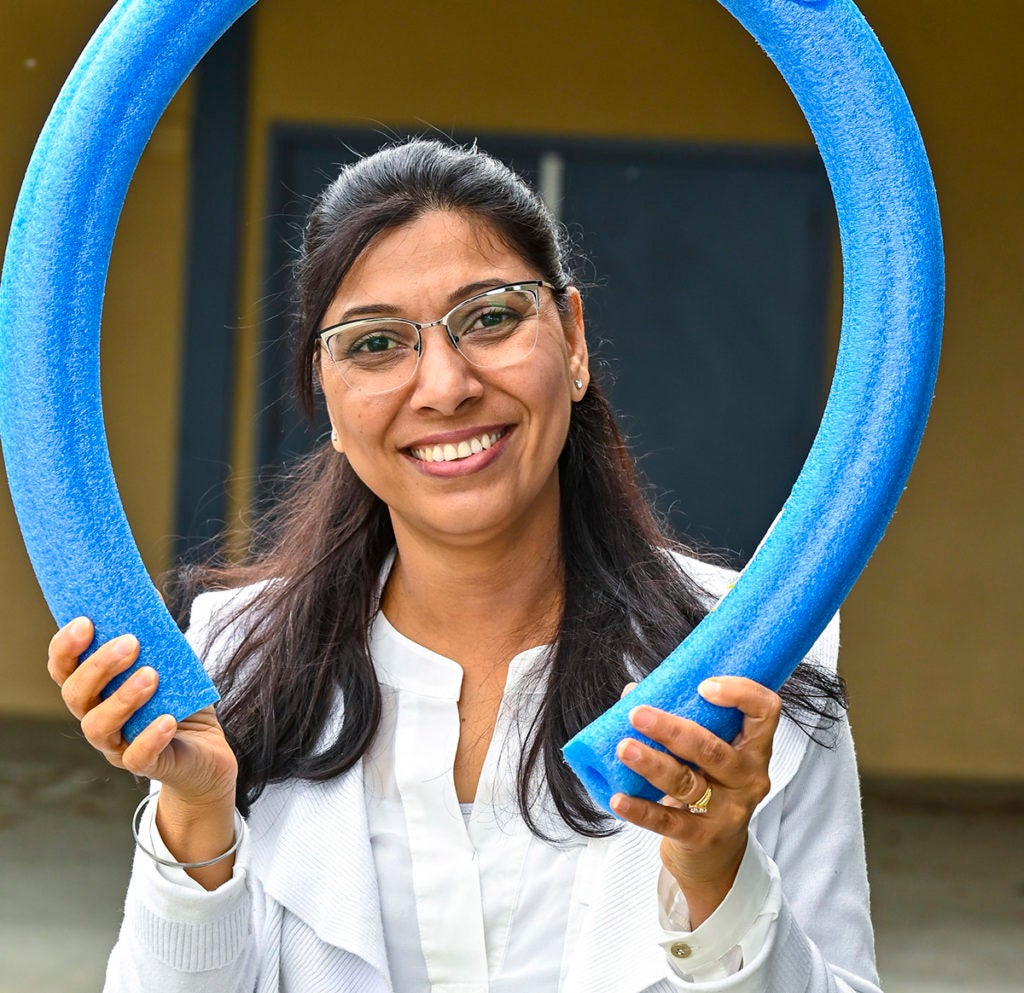
Randeep B.
StrongStart Facilitator
Westerman Elementary
“StrongStart provides a tremendous benefit to the children and families. This program is unique, as it provides a fun and healthy learning environment that benefits the entire family –at no cost. StrongStart makes it easier for new immigrant families to connect with community resources.”
We help children in early years, and also prepare them for kindergarten, using different activities and a variety of materials. We help them learn colours, numbers, shapes, the alphabet and to do simple direction activities in playful ways.
During the pandemic StrongStart looks very different as we are doing group time online. Children and parents/caregivers are engaged with me online for a one-hour session every day that include stories, music and movement, scavenger hunts, colours, numbers, and fine motor activities. Doing online sessions is very challenging with the early years as some families have minimal or no supplies.
As ECEs we need to think outside of the box to provide and offer them activities which are easily accessible at home. For example, making patterns with spoon and fork (learning about Math); teaching concepts of “big” and “small”; looking at textures of fruit and vegetables and other activities using household flyers. We help parents prepare their children for kindergarten by giving them strategies to teach their children self-help skills like putting on shoes, clothing and jackets, opening their lunches, and reading books and telling stories every day. If children struggle during the online session, I offer parents one-on-one sessions with their children to help ease any issues.
I am enthusiastic and love these little ones – their innocence and priceless smiles have inspired me through the years. My journey of learning is continuous and ongoing, each child teaches me something new, and I truly love learning with them each day. I have a deep connection to my work with children and believe that the relationships that we develop together are bridges to lifelong learning.
Kim P.
Head Secretary
Cloverdale Traditional Elementary
“I’m in a small school so four days a week I’m the only clerk in the building. On an average day I open the school in the morning, unlock gates, and turn on the lights. When kids arrive, I do attendance. If a child is away and the family has not let us know why, we call to make sure that they are safe. “
The rest of the day I do whatever is needed – newsletters, student files, updating the web site, getting bulletins to families, assisting the principal, keeping records, and I try to do whatever I can to help the teachers as well. There is always a lot of ice packs and band-aids and if a child is not feeling well, I call their family to pick them up. During the pandemic my job entails more giving out masks and calling families if the child has the sniffles.
It is a lot of work but after 16 years I still love it. I’ve been full-time at four different schools and each one has its own challenges and its own joys. I still love going to work.
I make sure that the office is a safe space so that kids having a rough time know that they can come there and get attention and care. Sometimes at home they don’t feel like they’re not seen or heard. So, I want to make sure that at school they matter and they are welcome to come to me at any time.
The pandemic has changed the dynamics in schools. I don’t see kids the way that I used to because they don’t come up all the time. I miss seeing the kids – their smiles and not being able to see them light up with joy. You see it in their eyes but it’s different when they have a mask on or you’re constantly saying, “pull your mask up, put on your mask.”
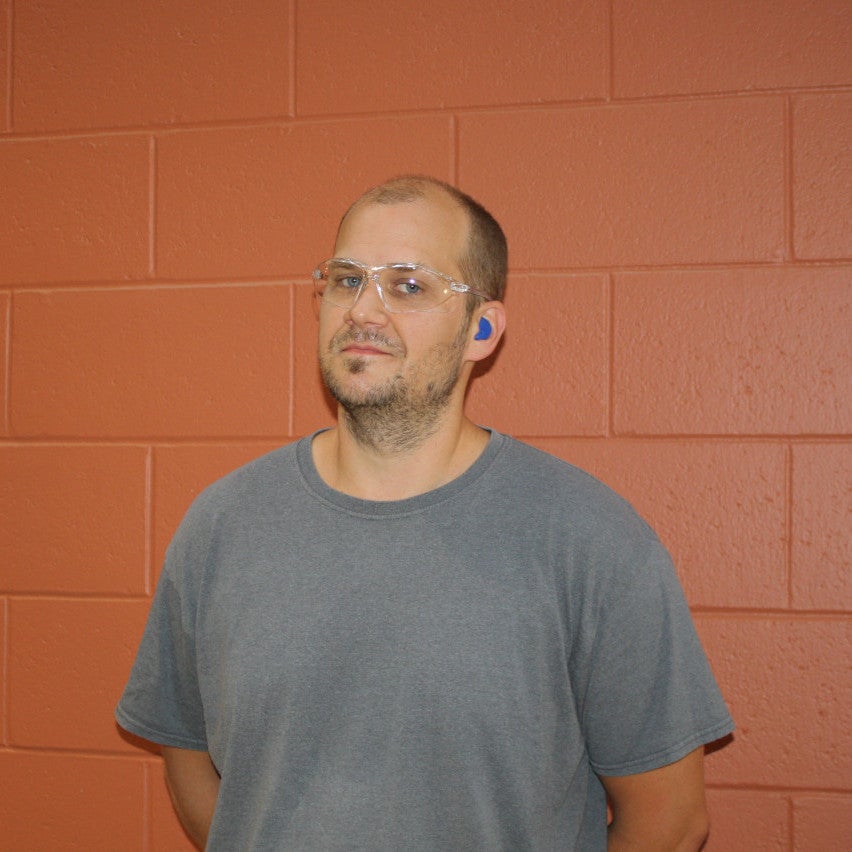
Ben K.
Carpenter
School District 36 / District Facilities Centre
“I’ve always enjoyed working with my hands and problem solving. Working throughout the district I have been to most school sites. “
My day starts at the District Facilities Centre (DFC). I check in with my foreman to see if there is anything urgent, such as vandalism, to take care of. If not, I carry on with what I was working on the day before, whether in the DFC carpentry shop or at a school.
We deal with cabinet and counter repairs and upgrades; install shelving, storage and cloak rooms; build portable stairs and ramps; fix doors and locks; replace ceiling tiles; and repair drywall – just to list a small variety of our jobs.
During the pandemic we’ve had the usual health order restrictions as well as plexiglass barriers in our vehicles. I can understand how traveling to multiple sites would be difficult for some people.
If anything, this past season has reminded me that any job, personal possession or even loved one can be taken from you in a moment. I’m thankful for what I still have and try not to take anything for granted.
Connie P.
Safe School Liaison
North Surrey Secondary
“I’m constantly working hard to build relationships and trust with my kids through positive interactions. It’s all about engaging with them, finding out who they are and what they’re like. I try to get involved as much as I can because that’s what I say to my kids: get involved.”
The most enjoyment I have in my job is meeting, connecting, and engaging with kids. I enjoy learning about them, who they are, what they like to do, what they are passionate about – getting to know my kids and build relationships.
As a safe school liaison, I do perimeter checks and ensure that the buses can get through the laneways to drop off our kids with special needs and I make sure that the interior roads are clear for kids when they are walking into school. I try to be a presence as the kids come in.
I welcome them to school and help them get to their classroom if needed. I patrol school grounds and the hallways. If I identify potential safety concerns, I respond to them. I check bathrooms to make sure there are no students congregating there. If the admin team needs me to bring a student in for whatever reason, I go into the classroom and escort them to the office. For the most part I work directly with my admin team. Having good rapport and relationships with kids helps me do my job well.
As well as dealing with physical safety, my job is also to use prevention techniques to help kids deal with inappropriate behaviours. When we make bad choices, even if we do it again, that doesn’t define us. Sometimes kids don’t make great choices, and those choices don’t define them either. It can take kids two or three times, but at the end of the day, they understand about good and bad choices.
Henry L.
Indigenous Child/Youth Care Worker
AHP Matthew Elementary / Kwantlen Park Secondary
This job is very relationship-based. As aboriginal child care workers we do a transition with kids going from elementary to grade 8 and we start working on that relationship with them right away. They know they are coming into a safe space and will have familiar, safe people around. They need a safe space to let it all out – tell us about their boyfriends or girlfriends or things that happen at home – and know they won’t get in trouble with us.
Some of our kids are food insecure and don’t have snack food at home. In the morning when kids come in, we have porridge or granola bars and they can sit and have a snack with us. If they don’t want to go class or might skip, we escort them to class. Sometimes kids also have lunch with us and shoot the breeze about how their day is going so far.
In secondary, I help students with homework or with directions on something the teacher has told me they need to work on, like complete an essay on two-spirited people. I’d help them with research and give them a personal story from my personal experience that could help them. I share a lot of my personal life, so it gives familiarity to the story.
I also do a lot of cultural presentations and sometimes teachers ask me to explain about my language. I tell students that my language is not the language of this area and that there are different types and dialects of languages. I do a lot of orange shirt day presentations and I share what happened to my family in residential school.
I work with the student’s whole family and community. I have strong connections with the kids because they know I know their parents. Some of our families don’t have the tools to be a parent. If they need support in parenting, I refer them to different organizations in the community that can help.
This pandemic has badly impacted my work because it limits the number of students in schools and offices. A lot of students are in a blended learning program and because they don’t respond online, we don’t have a good connection with them. Today we had five kids that wanted to come into the office where I work and our limit is three so we had to ask kids to leave. Kids feel like they got pushed away from their safe space and feel abandoned. It’s very hard to manage so these kids don’t feel neglected or alone.
Steve H.
Team Leader – IMS
District Education Centre
Students rely on technology in schools. The IT department ensures that all computers, ipads, network, wi-fi, printers — all technology that students and Staff use — works correctly in classrooms.
We have six different teams: site techs (repair computers); service desk; infrastructure; new technology; applications (Office 365, web); and security and operations, which is my team.
Security and Operations ensure that the district’s servers, hardware, internet and network is always operational and running at peak efficiency. We also take care of all the computer security – ensuring that servers, computers and the network is patched – so that malicious people can’t get into our network and cause issues, and also to keep data safe.
I meet with my team every day, and we go over issues and problems from the previous day to make sure everybody is on track with what they are working on. We sometimes involve other teams to help us out. My day consists of ensuring that my team is operating efficiently, is not falling behind on any projects, and has the tools and resources they need to get their jobs done. My role is supervisory, but it goes a little bit beyond that. Every day brings new challenges and problems to solve, which is interesting and fun.
Ann S.
Multicultural Worker
North Surrey
Multicultural workers work with a range of vulnerable students and families that come from other countries. Most of them are immigrants and refugees. They have no or very limited English and they don’t understand how the school system works in BC. We are the bridge between schools and the families. We help the family understand how things work here, and help the school understand what the students experienced back home. I work mainly with Cantonese and Mandarin students and families.
As multicultural workers, we have the background of their home country, and understand how it’s different from here in B.C. For example, there is no Learner Centre in mainland China. When kids are out of regular high schools, they are on their own. We wanted to refer one of our students to Guildford Learning Centre because the flexible schedule fits her needs. Her dad panicked when he got the news, being worried that she would have nowhere to go. It took us a while to explain how the system works here, and how we can continue to support her in the Learning Centre.
Imagine you are moving to another country, where you don’t speak the languages and or understand the system. How could you support your kids if they have trouble in school? I really appreciate that through my job, it’s possible to make a difference in someone else’s life.
The relationship between teachers and the student support staff is just like doctors and nurses. We need each other to provide the best service to our next generation.
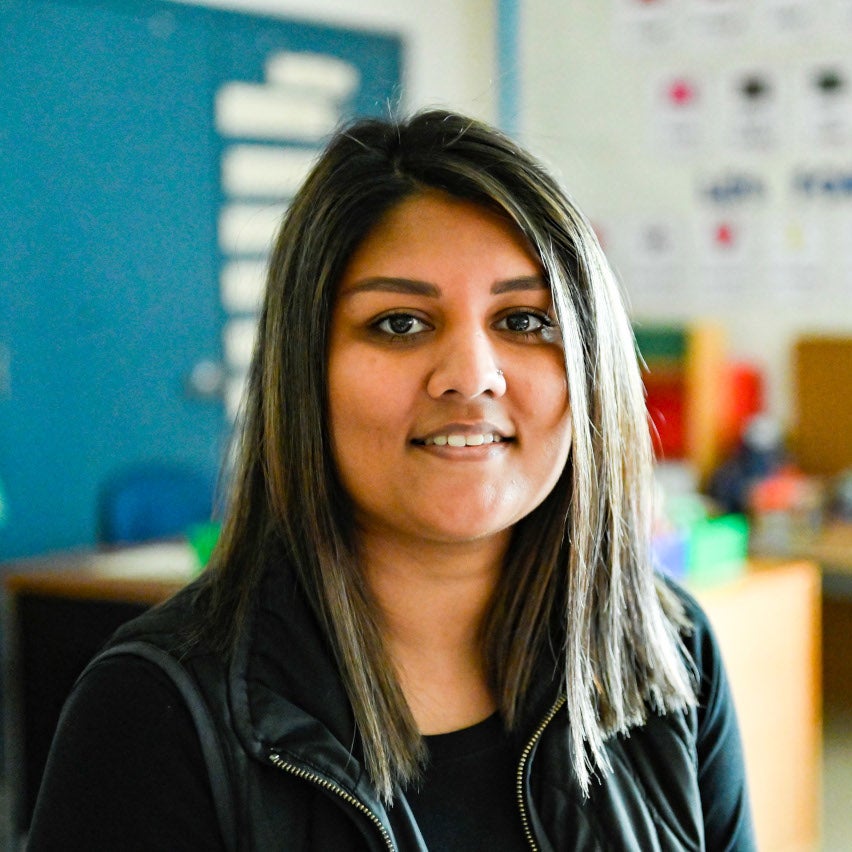
Rajni K.
Child/Youth Worker
Green Timbers Elementary
This work is always interesting – there’s never a dull moment. I love that I’m able to help children, to be their go-to person, with small and big things. It feels good, it’s rewarding.
With social/ emotional stuff it’s essential for students to have a trusted adult to check in with, to share the big things, the small things, things that they be excited about, or things they are struggling with. For a lot of kiddos their homelife isn’t the best, so coming to school and having a lot of safe adults around gives kids a sense of safety and some confidence. They know that they are in a safe place and have people that they can turn to.
It takes a long time to build relationships and trust with the students, to help the student feel safe and comfortable enough to start with casual conversation. It takes patience to build that rapport so you can’t give up. There are days when you sit together and colour and only a few words are shared back and forth. And there are some days there’s not enough time to talk about what’s going on
In the beginning of the pandemic, I worked from home before I put my name in to do child care for children of essential services workers. When we got back into classrooms, not being able to mix kids from various grades or do groups with other classrooms really limited their interactions, the games we could play, and the arts and crafts kids were able to do. Life skills were put on hold because of food restrictions. We couldn’t be sharing.
Overall being there for the kids and putting the kids first is super important. Sometimes we may forget that every now and then when our personal lives get a little crazy. Seeing a familiar face and having continuity is necessary for the kids who can end up moving around a lot if their hours of access get cut. I’ve been lucky to be at Green Timbers for six years, so I’ve been able to watch the kids grow. I know their history and have a deep understanding of who they are, how they work and what triggers them. Having that deep rapport takes a very long time to build and is super important.
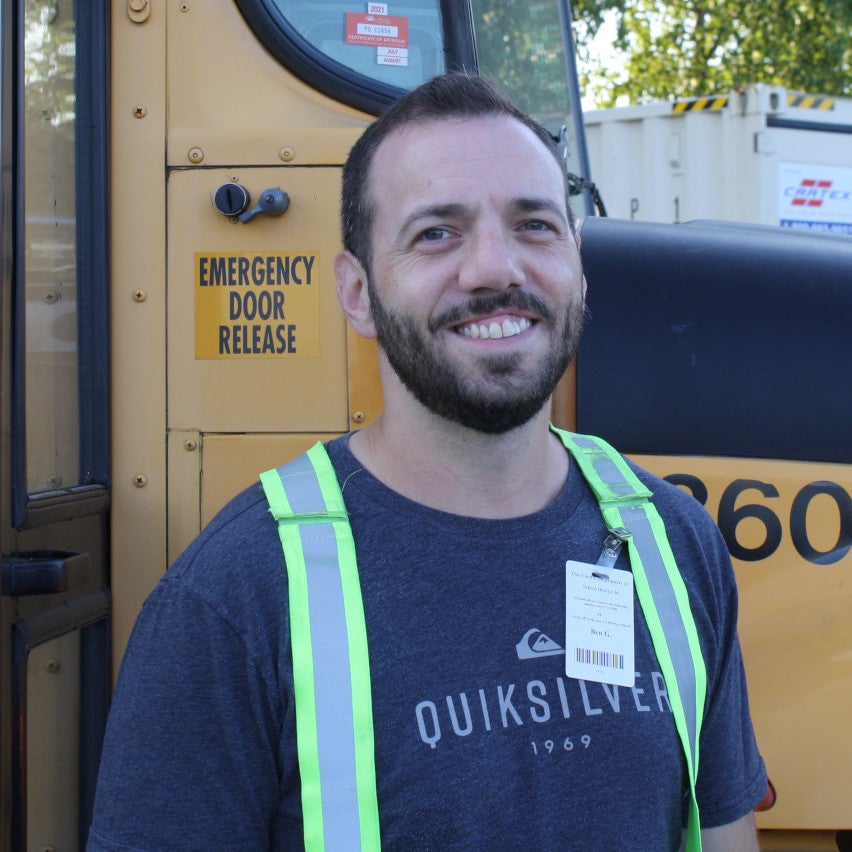
Ben G.
Equipment Operator II / Spare Bus Driver
SD36 Facilities Centre
Spare drivers cover for full-time drivers when they’re away on holidays or on leave. We do their respective bus routes in the morning and afternoon. Most days run quite smoothly; the kids are pretty good for the most part. You sometimes have to remind them of the proper etiquette if someone is getting out of hand or bugging you while you’re driving. Safety is the biggest thing, to make sure everyone is safe and doing what they’re supposed to be doing, which is just taking it easy and relaxing on the way to school.
I really enjoy the equipment operator job. I like that I get to drive all over the city and meet lots of different people. It’s a physical job and I really enjoy that part. It’s great exercise.
There’s lots of driving from school to school. We move and transport anything in the building – furniture, equipment, supplies – anything that needs moving around. We remove old furniture and bring in the new, and deal with lots of moves of classrooms and teachers moves.
I have been doing this work for almost 9 years. The pandemic affected us quite a bit. Thankfully we never stopped.
On the bus we followed extra cleaning procedures, and everyone had to wear a mask. We had to make sure the windows were open a little bit for ventilation and everybody had assigned seating. It was very strict, which was nice in terms of keeping order. We had a little extra work for more detailed cleaning like spraying and wiping high touch areas. For the rest of my work nothing really changed at all, besides we loaded lots of masks and PPE. We were still very needed around the district which felt good.
As a bus driver, getting kids to school safely and on time is the number one goal of our department. Safety is the biggest thing: keeping everyone safe on the bus and the other motorists on the road. We always try to be on time and be as cautious as we can. For my other work, we are support staff, a cog in the wheel that helps keep the machine moving smoothly. We try to be as accommodating as we can and do what we can in and around schools.
